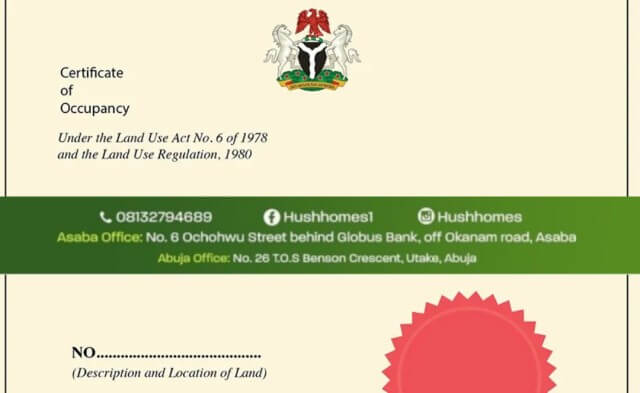A Certificate of Occupancy (C of O) is a critical document in Nigeria’s land ownership landscape. It legally validates ownership of a property and protects landowners from disputes. If you’ve ever wondered why this document is essential, the cost implications, or the processes involved in obtaining one, this article provides a comprehensive breakdown to equip you with all the necessary knowledge.
What is a Certificate of Occupancy?
The Certificate of Occupancy (C of O) is a legal document issued by the government to individuals or entities granting them the right to occupy and use a specific parcel of land for a stipulated number of years, usually 99. It provides proof of ownership, protects against unlawful claims, and ensures compliance with the Land Use Act of 1978, which governs land ownership in Nigeria.
Unlike informal claims to land, a C of O serves as an official acknowledgment of ownership, giving the holder legal authority over the property.
Importance of a Certificate of Occupancy in Nigeria
- Land Ownership Rights Protection
In Nigeria, land disputes are common due to overlapping claims and unclear ownership structures. With a C of O, you solidify your ownership rights, ensuring legal security over your property.
- Preventing Legal Disputes
- Possessing a Certificate of Occupancy reduces the likelihood of land disputes, as it clarifies the rightful owner recognized by law.
Eligibility for Loans and Investments
Financial institutions and investors often require a Certificate of Occupancy as proof of ownership before granting loans or partnerships. It reassures lenders and buyers of the legitimacy of your ownership.
The Process of Obtaining a Certificate of Occupancy in Nigeria
Steps to Apply
- Visit your state’s land bureau to obtain an application form.
- Submit the completed form alongside the required documents such as a survey plan, title deed, and passport photographs.
- Pay the prescribed application fees.
- Await site inspection and verification by land officers.
- Once approved, the Certificate of Occupancy is issued.
Required Documentation
- A detailed survey plan of the property.
- Evidence of land ownership or purchase.
- A completed application form.
- Payment receipts for fees.
Timeline for Obtaining the Certificate
On average, the process can take three months to a year, depending on the state and the efficiency of its land bureau.
Cost of Certificate of Occupancy in Nigeria
Government Fees and Associated Costs
The cost of obtaining a Certificate of Occupancy varies across states. Factors like land size, location, and administrative fees determine the final cost. For instance, in Lagos State, fees range from ₦100,000 to ₦300,000 for residential lands.
Hidden Costs to Watch Out For
Additional costs may include survey fees, legal fees, and the cost of land registration. Ensure you clarify all expenses upfront to avoid surprises.
Challenges in Obtaining a Certificate of Occupancy in Nigeria
- Bureaucratic Delays
- Lengthy processing times can be frustrating. To minimize delays, ensure all documentation is accurate and complete.
- Common Mistakes During Application
Errors in survey plans or incomplete forms are common issues that can lead to rejection. Working with experienced surveyors and legal experts can help.
Overcoming Challenges
- Hire professionals for guidance.
- Regularly follow up with the land bureau.
- Familiarize yourself with your state’s specific requirements.
Benefits of Having a Certificate of Occupancy
A Certificate of Occupancy enhances property value, provides legal security, and opens up financial opportunities. Landowners can confidently enter transactions knowing their rights are protected.
How to Verify the Authenticity of a Certificate of Occupancy
Steps for Verification
- Visit the issuing state’s land bureau with the document.
- Search to confirm registration details.
- Cross-check the document’s serial number with official records.
Red Flags
Watch for name inconsistencies, survey numbers, or missing government stamps, which may indicate fraud.
Conclusion
Securing a Certificate of Occupancy is essential for any landowner in Nigeria. It provides peace of mind, prevents disputes, and unlocks financial opportunities. While the process may seem complex, understanding the requirements and seeking professional guidance can simplify it.

